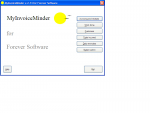J Trahair
Well-known member
Hi. I have a large project which will lead to a large exe (in terms of file size). So I am thinking of having an exe consisting of a LogInAndWhereToFromHere selection of buttons which run the other exe files, eg. CustomersAddresses.exe, Invoicing.exe, Reports.exe etc. All in VB.Net.
Opening these exe files will be easy, but if one or two of these other exe files are open when the user closes LogInAndWhereToFromHere.exe, how can I get the other exe files to close automatically?
Thank you.
Opening these exe files will be easy, but if one or two of these other exe files are open when the user closes LogInAndWhereToFromHere.exe, how can I get the other exe files to close automatically?
Thank you.

